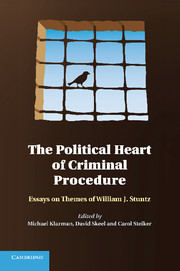Book contents
- Frontmatter
- Contents
- Contributor List
- Introduction: Appreciating Bill Stuntz
- Part I The Political Economy of Substantive Criminal Law
- Part II Police Investigations
- 5 The Accidental Feminist
- 6 The Distribution of Dignity and the Fourth Amendment
- 7 Why Courts Should Not Quantify Probable Cause
- 8 DNA and the Fifth Amendment
- Part III Emotion, Discretion, and the Judicial Role
- Index
- References
7 - Why Courts Should Not Quantify Probable Cause
Published online by Cambridge University Press: 05 March 2012
- Frontmatter
- Contents
- Contributor List
- Introduction: Appreciating Bill Stuntz
- Part I The Political Economy of Substantive Criminal Law
- Part II Police Investigations
- 5 The Accidental Feminist
- 6 The Distribution of Dignity and the Fourth Amendment
- 7 Why Courts Should Not Quantify Probable Cause
- 8 DNA and the Fifth Amendment
- Part III Emotion, Discretion, and the Judicial Role
- Index
- References
Summary
Introduction
Probable cause is a basic tool of Fourth Amendment law. It appears prominently in the constitutional text: “no warrants shall issue, but upon probable cause.” Police power often depends on it. In a range of settings, searches and seizures are constitutional if the police have probable cause but unconstitutional if they don't. But just how “probable” is probable cause?
The Supreme Court has declined to say. The Supreme Court has described probable cause as a “nontechnical conception” that requires proof of a “fair probability.” The Court has also said that probable cause exists when “a man of reasonable caution” would believe an offense has been committed. But the Court has refused to quantify probable cause. “The probable-cause standard is incapable of precise definition or quantification into percentages,” the Court recently declared, “because it deals with probabilities and depends on the totality of the circumstances.”
- Type
- Chapter
- Information
- The Political Heart of Criminal ProcedureEssays on Themes of William J. Stuntz, pp. 131 - 143Publisher: Cambridge University PressPrint publication year: 2011
References
- 4
- Cited by



